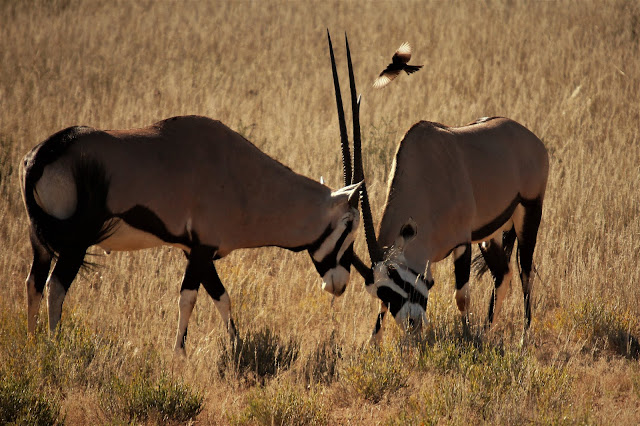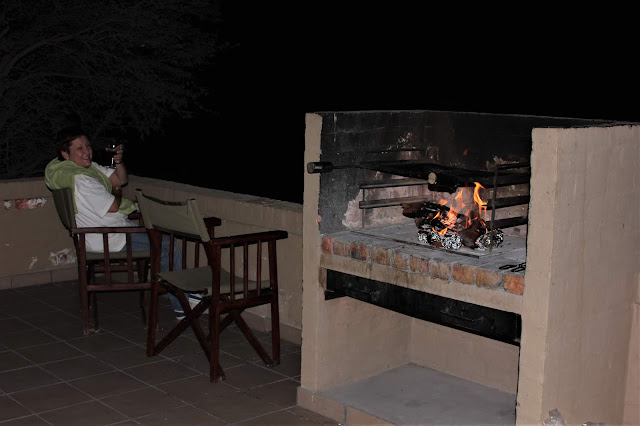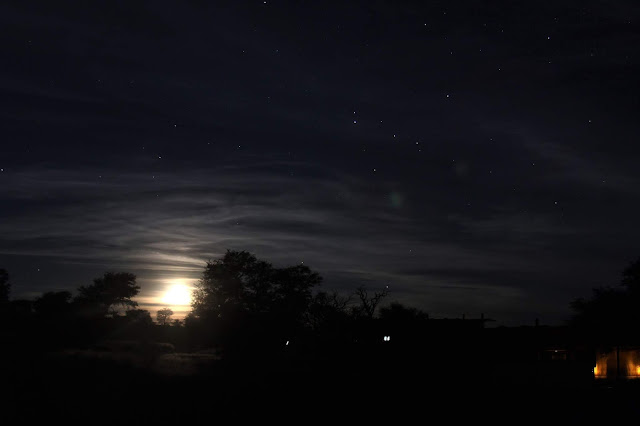 |
| King of the jungle |
One of my favourite places in the world is the Kgalagadi Transfrontier Park. This was previously known as the Gemsbok national Park. The park boarder on Namibia on the western side and Botswana on the Eastern side. The Nature reserve is in South Africa and Botswana and visitors to the park can travel freely between the South African side of the park and the Botswana side.
 |
| Gemsbok fighting |
My wife (Marie) and I have visited the park numerous times. Both of us are keen wildlife photographers and this park is a wonderful place for wildlife photography. The Park is a desert region with red sand dunes. In the South African part of the park, the roads and camps are along the two dry river beds. There are many man made water holes along these dry river beds, so much of the wildlife is concentrated in or around the river beds.
 |
| Ground squirrel | |
This is a wonderful place for predators. You can count yourself very unlucky if you have spent a few days in the park and have not seen lion. In winter, it gets very cold at night in the park, and the lions tend to move into the dunes, so a bit more difficult to see lions in winter, but still there is always a great chance for lions. This is also a wonderful hunting ground for cheetah. Flat open country, where the speed of the cheetah comes into its own. Apparently it is also very good for leopard, but I have not been very lucky in that regard. Only ever seen one once. Some of the smaller cats can also be seen and on one trip we saw many African wildcat. These small cats are very difficult to see in many other reserves due to the tall grass, but in the Kgalagadi, there is not some much grass.
 |
| Bat eared fox |
Bat eared foxes are also pretty common, and it is even possible to see mice and other smaller mammals. Ground squirrels and meercats are also plentiful. The ground squirrels in the camps have become very tame and are really beautiful to watch.
Then there are the herds of springbok and gemsbok. I just love stopping the car in the middle of a herd of springbok and just watching them do their thing. The nice thing about the Kgalagadi is that there are not so many cars, so yo can spend an hour or two just sitting at a waterhole or in the middle of nowhere without a constant stream of cars asking you what you are looking at. This can be quite a problem in parks like the Kruger National Park, where there are a lot of cars.
 |
| Young Springbok |
 |
| Giraffe - not common there |
 |
| Braai at Mata Mata |
So, my sister, Cynthia and I did a trip to the Kgalagadi. We stayed a night in Twee Riviern and then went to Mata Mata and at the tented Camp. We spent most of the time around Mata Mata. We had a really great time with some very good sightings. One of the best was a spotted hyena den with a female and cubs. Her den was very close to the road, and we spent hours watching the pups playing. I took quite a few photos there.
 |
| Moon rise at Urikarus |
 |
| Hyena with pups |
 |
| Moon rise at the Tented camp |
On our drive back for our last night at Twee Rivern, we saw lion on the ridge of the river. They looked pretty small. It was two young cubs and an older cub. Strange to see three lion cubs without and adult. We watched them for about an hour and then headed down the road. After about a km, there was a female and two males heading in the direction of the cubs, so I turned the car around and we followed them. The female got to a tree, and started to look very upset. This was obviously where she had left the cubs and they were gone! She was looking all over for the cubs. She then started to call them. The cubs on the ridge answered her. She went charging up the hill to be reunited with her cubs. Then all cam down the ridge and settled down under a tree. A really wonderful experience to watch. We spent about three hours just watching these lions.
 |
| Looking for her cubs |
 |
| Found them |
 |
| Altered reality photo of the lions |
All too soon it was time to head out of the reserve and head back to "civilisation" of the concrete jungle that is Johannesburg. Far more civilised in the African bush if you ask me.
 |
| Bird watching at a water hole |



















Comments
Post a Comment